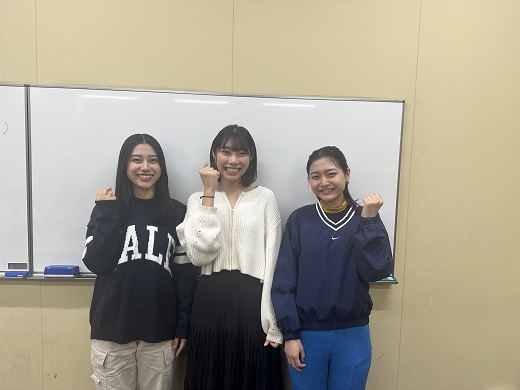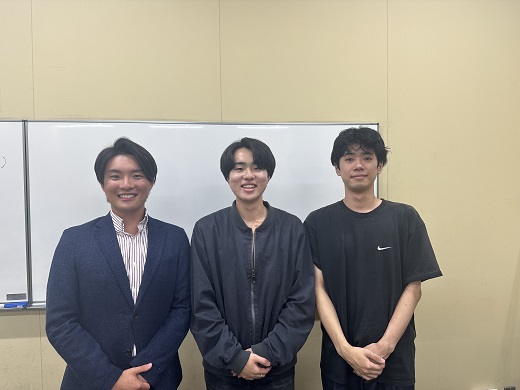[School of Political Science and Economics] Two groups of OKUYAMA Masayuki Seminar win Grand Runner-up and Excellence Award at 9th SDGs Student Essay Award by Sumitomo Riko
Nov. 22, 2023


Two groups of the OKUYAMA Masayuki Seminar in the School of Political Science and Economics won the Runner-up Award and Excellence Award at the 9th SDGs Student Essay Award by Sumitomo Riko (Screening Committee Chairman: TAKAMURA Yukari, Professor, Institute for Future Initiatives, the University of Tokyo)
The theme of the essays was “’Personnel strategies in the era of SDGs/ESG’ that grow businesses sustainably.” It is to offer a specific way from a unique perspective of students for effective personnel strategies for businesses to meet the demands of every stakeholder, including future generations, and to realize human capital management that grows them sustainably based on “8. Decent work and economic growth” as one of the 17 SDGs. The number of characters for an essay was between 9,500 and 10,500. This year, a total of seven essays were selected for the Grand Award, Grand Runner-up Award, Excellence Awards (three groups), and Judges' Special Awards (two groups) through a screening panel of experts.
The winners and the titles of the winning essays are as follows:
The essay, Personnel Strategy of SMEs Connecting with Youths Through Purpose: Through Experiments of Co-Creation of Purpose Between Businesses and Students, selected for the Grand Runner-up Award proposes specific ideas for the use of purpose as a personnel strategy through the experiments of co-creation of purpose, which the Seminar conducted with the help of two leading SMEs.
The essay, Regional Collaborative Alumni Communities as a New Personnel Strategy of Local SMEs, selected for the Excellence Award suggests approaches for human capital management that enhances sustainable growth in the region through creating communities of alumni (former employees), which is becoming popular among large enterprises, collectively by local SMEs instead of by a single SME.
Each comment from representatives of the award-winning teams
YAMATO Yuma (junior): Having learned that labor shortages have become a serious problem for SMEs, we have become aware of the issue that the personnel strategies of SMEs have not properly dealt with major changes in values of youths. We therefore proposed sustainable personnel strategies making use of “purpose,” which represents the raison d'etre of businesses. I am encouraged by the award to continue my studies, and I would like to make efforts to contribute to the achievements of SDGs.
TOKORO Kanta (junior): Inspired by “Local Industry,” which we study in the Seminar, we narrowed down the target to local SMEs and proposed regional collaborative alumni communities where local SMEs collectively organize alumni and revitalize the spillover of knowledge in the region as a personnel strategy in combination with alumni management, which is becoming popular these days. I will make use of this experience in future seminar activities and increase my efforts for further growth.
≪Japanese version≫
The theme of the essays was “’Personnel strategies in the era of SDGs/ESG’ that grow businesses sustainably.” It is to offer a specific way from a unique perspective of students for effective personnel strategies for businesses to meet the demands of every stakeholder, including future generations, and to realize human capital management that grows them sustainably based on “8. Decent work and economic growth” as one of the 17 SDGs. The number of characters for an essay was between 9,500 and 10,500. This year, a total of seven essays were selected for the Grand Award, Grand Runner-up Award, Excellence Awards (three groups), and Judges' Special Awards (two groups) through a screening panel of experts.
The winners and the titles of the winning essays are as follows:
| Award winners | Title of essay |
|---|---|
| Grand Runner-up Award YAMATO Yuma, TAKAGISHI Mao, and HATA Yurie, juniors of OKUYAMA Masayuki Seminar in School of Political Science and Economics |
Personnel Strategy of SMEs Connecting with Youths Through Purpose: Through Experiments of Co-Creation of Purpose Between Businesses and Students |
| Excellence Award TOKORO Kanta, MARUNO Izumu, and KANBARA Kazuki, juniors of OKUYAMA Masayuki Seminar in School of Political Science and Economics |
Regional Collaborative Alumni Communities as a New Personnel Strategy of Local SMEs |
The essay, Personnel Strategy of SMEs Connecting with Youths Through Purpose: Through Experiments of Co-Creation of Purpose Between Businesses and Students, selected for the Grand Runner-up Award proposes specific ideas for the use of purpose as a personnel strategy through the experiments of co-creation of purpose, which the Seminar conducted with the help of two leading SMEs.
The essay, Regional Collaborative Alumni Communities as a New Personnel Strategy of Local SMEs, selected for the Excellence Award suggests approaches for human capital management that enhances sustainable growth in the region through creating communities of alumni (former employees), which is becoming popular among large enterprises, collectively by local SMEs instead of by a single SME.
Each comment from representatives of the award-winning teams
YAMATO Yuma (junior): Having learned that labor shortages have become a serious problem for SMEs, we have become aware of the issue that the personnel strategies of SMEs have not properly dealt with major changes in values of youths. We therefore proposed sustainable personnel strategies making use of “purpose,” which represents the raison d'etre of businesses. I am encouraged by the award to continue my studies, and I would like to make efforts to contribute to the achievements of SDGs.
TOKORO Kanta (junior): Inspired by “Local Industry,” which we study in the Seminar, we narrowed down the target to local SMEs and proposed regional collaborative alumni communities where local SMEs collectively organize alumni and revitalize the spillover of knowledge in the region as a personnel strategy in combination with alumni management, which is becoming popular these days. I will make use of this experience in future seminar activities and increase my efforts for further growth.
≪Japanese version≫


